The Case of the Fifth Word NCERT Solutions | English Poorvi Class 8 - New NCERT PDF Download
Let us do these activities before we read (Page 101)
I. Work in pairs. Solve the crossword puzzle given below with the clues in the form of anagrams.
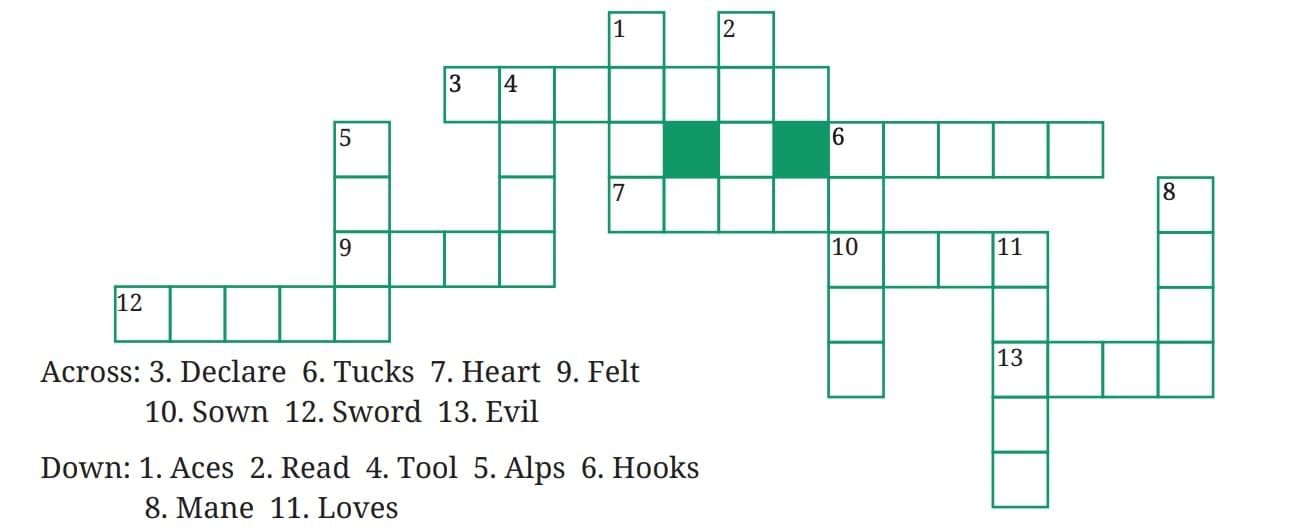
Ans: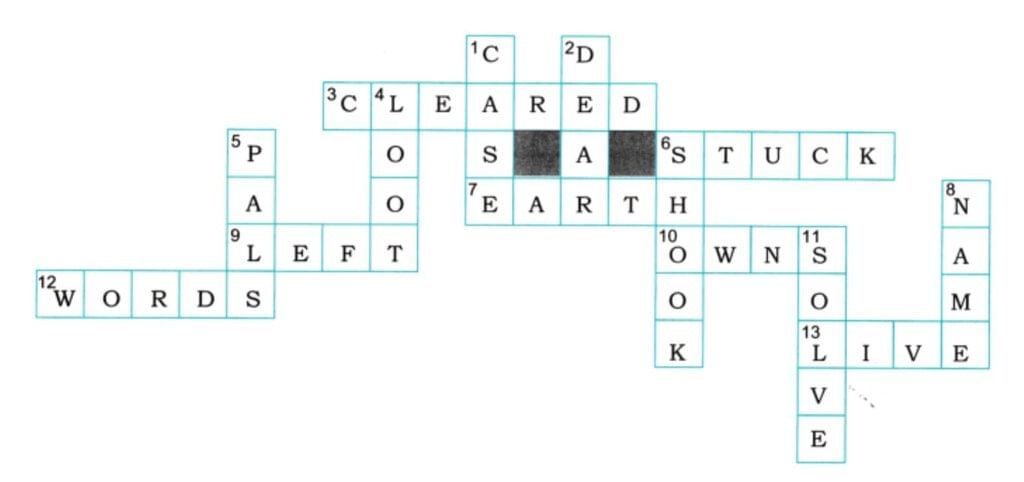
II. Work in pairs. Match the different meanings of ‘case’ in Column 2 with the correct usage in the sentences in Column 1. Share your answers with your classmates and teacher.

Ans:
Let us discuss (Page 104)
I. Complete the following statements with suitable reasons.
1. Leroy’s nickname was Encyclopedia, and everyone called him by that name because
Ans: he read many books and never forgot a fact, knowing more than anyone in Idaville.
2. At the dinner table on Tuesday night, Chief Brown stared at his cream-of-mushroom soup as
Ans: he was thinking hard about the mysterious four-word code in the jewellery case.
3. Encyclopedia sat quietly at the dinner table because
Ans: he knew his parents were discussing the case for him to hear and solve.
4. Nolan put the will on the kitchen table because
Ans: he wanted to leave a clue about the hidden jewellery’s location for Davenport.
II. Do you think Chief Brown would need Leroy’s help to solve this case? If yes, why? If no, why not?
Ans: Yes, Chief Brown needed Leroy’s help because the four-word code (Nom, Utes, Sweden, Hurts) was confusing, and Leroy’s clever question about the fir tree solved the case quickly.
Let us discuss (Page 107)
I. A fact is something that can be proven true or false. A fact is not based on people’s beliefs. An opinion, on the other hand, is a belief, feeling, or judgment, and can vary from one person to another. An opinion cannot be proven. Identify which of the following statements from parts I and II of the story are facts or opinions. One example has been done for you. Share your answers with your classmates and teacher.1. Encyclopedia’s father was the Chief of Police.
Ans: Fact
2. Everyone thought that Chief Brown must be the smartest police chief in the country.
Ans: Opinion
based on people’s beliefs
3. An encyclopedia is a book or set of books filled with facts from A to Z.
Ans: Fact
definition of an encyclopedia
4. Leroy’s friends said that he was like a library and a computer rolled into one, and more user-friendly.
Ans: Opinion
friends’ subjective view
5. Two masked men held up the Diamond Mart on Sixth Avenue.
Ans: Fact
verifiable event
6. Nolan and Davenport had met while both were in prison in South Carolina.
Ans: Fact
verifiable past event
7. Chief Brown’s hunch was that Davenport and Nolan decided to hide the loot until things cooled down.
Ans: Opinion
based on Chief Brown’s belief
8. Nolan wrote a four-word code to tell Davenport where he had hidden the stolen jewellery.
Ans: Fact
verifiable action in the story
II. Complete the table by choosing the character traits of Leroy given in the box below. There is an extra word that you do not need. One example has been done for you.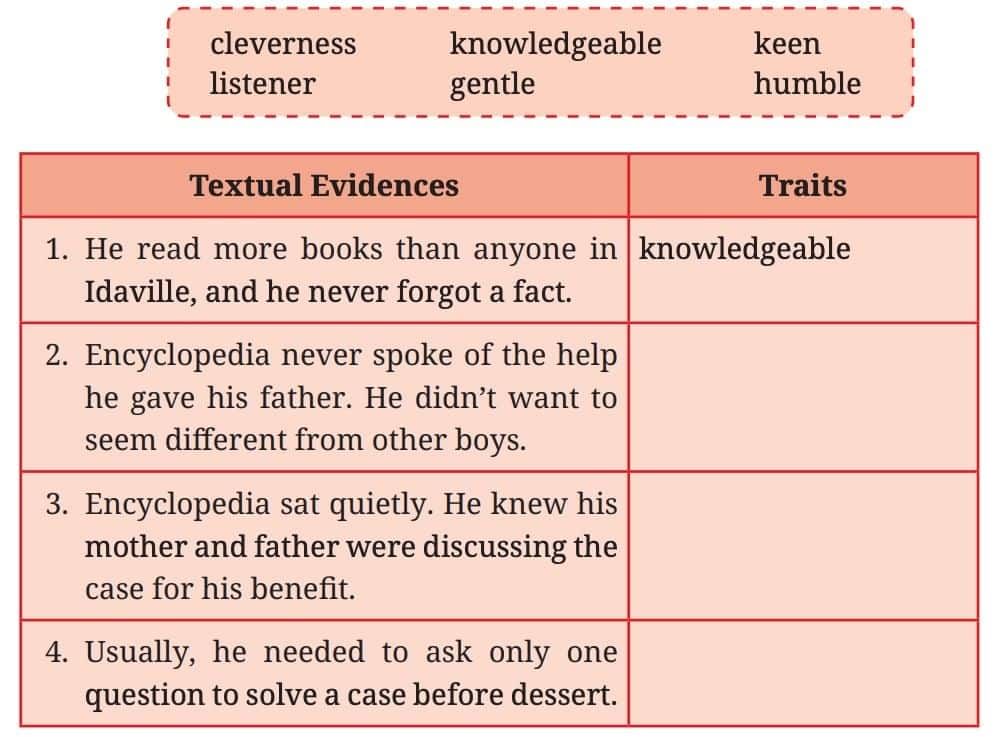 Ans:
Ans: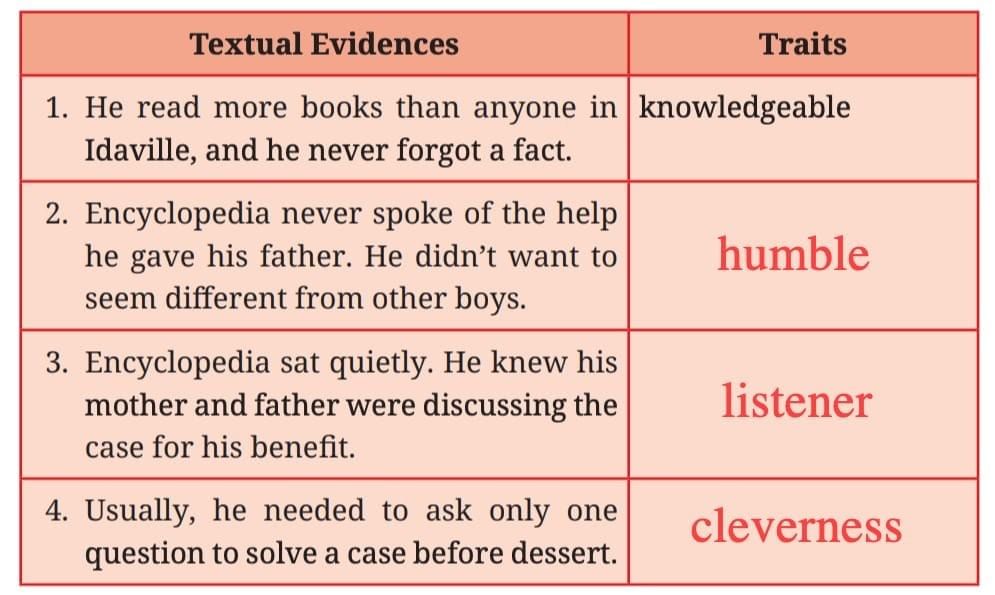
Let us think and reflect (Page 108)
I. Read the given extracts and answer the questions that follow.
1. Chief Brown would have liked to tell everyone about his only child. But who would believe him? Who would believe that the best detective alive was an eighth grader? So, he said nothing.
Encyclopedia never spoke of the help he gave his father. He didn’t want to seem different from other boys. But there was nothing he could do about his nickname. He was stuck with it.
Only his parents and teachers called him by his real name, Leroy. Everyone else called him Encyclopedia.
(i) Complete the following sentence with a suitable reason.
Chief Brown’s dilemma can be called unique because____________.
Ans: Chief Brown’s dilemma can be called unique because he wanted to tell everyone his son was a brilliant detective, but no one would believe an eighth grader could be so talented.
(ii) What can be inferred about why Encyclopedia never spoke of the help he gave his father?
A. He is shy and lacks confidence in his abilities to share his insights.
B. He wants to avoid the jealousy others might feel about his skills.
C. He desires to blend with the other boys to prevent seeming different.
D. He is embarrassed about being smarter than most adults around him.
Ans: C. He desires to blend with the other boys to prevent seeming different (text states he didn’t want to seem different).
(iii) The parents choose not to call their son ‘Encyclopedia’. Select the reason that is false.
A. For them, he is more than his unique abilities; he is their child, with a personal identity.
B. Calling him by his real name reflects their affection and the desire to acknowledge him as an ordinary boy.
C. They want him to be remembered as different from the others around.
Ans: C. They want him to be remembered as different from the others around (parents use his real name to treat him as
(iv) What does the writer mean by the fact that Leroy was ‘stuck with’ the name Encyclopedia?
Ans: It means everyone called him Encyclopedia because of his vast knowledge, and he couldn’t change this nickname.
2. Chief Brown studied the four words: Nom Utes Sweden Hurts. He shook his head and passed the notebook to Mrs. Brown again. “Can you figure it out?”
“Nom is a shortening of nominative, a grammatical term,” stated Mrs. Brown, who had taught English and other subjects in high school.“Utes is an American Indian tribe. Sweden is a country in northern Europe. Hurts is hurts.”
She lifted her gaze to Encyclopedia and shook her head.
“I can’t figure it out,” she confessed. “Davenport disappeared right after the hold-up,” Encyclopedia reminded her.
(i) What does Chief Brown’s reaction of shaking his head suggest about his understanding of the four words?
A. He is confident that the words are a clue.
B. He is confused, unable to make sense of the words.
C. He believes the words are random and meaningless.
D. He thinks the words are unrelated to the case.
Ans: B. He is confused, unable to make sense of the words (shaking his head indicates confusion).
(ii) Identify whether the given statement is true or false. Mrs. Brown explained the actual meanings of the individual words rather than decoding the hidden message behind them.
Ans: Mrs. Brown explained the actual meanings of the individual words rather than decoding the hidden message behind them – True (she defines each word literally, not as a code).
(iii) What does Mrs. Brown’s inability to decode the words suggest about the message?
Ans: It suggests the message is cleverly hidden and requires specific insight to understand.
(iv) Complete the following sentence suitably.
The purpose of Encyclopedia’s reminder in the last line of the extract was to _________________. (refocus the discussion on the context of the crime/suggest that the coded message was meant for Davenport/imply that the message was likely a clue about the location of the stolen jewellery)
Ans: The purpose of Encyclopedia’s reminder in the last line of the extract was to suggest that the coded message was meant for Davenport.
II Answer the following questions.
Ans: They met in prison, became friendly due to shared interests, and Davenport lived with Nolan before the robbery.
Ans: He disappeared to avoid suspicion after the robbery. If Nolan hadn’t died, they might have waited longer to retrieve and share the hidden jewellery.
Ans: She is curious and engaged, as she asks questions and tries to understand the code.
Ans: He was proud because Encyclopedia solved mysteries quickly, like finding the jewellery with one question.
Ans: His suspicions were justified because Nolan and Davenport were friends from prison, lived together before the robbery, and a clerk thought she recognised Nolan.
Ans: The code (Nom, Utes, Sweden, Hurts) represented days (Monday to Thursday), hiding the fifth word (Fir for Friday), which led to the jewellery’s location in a fir tree’s jug.
Ans: Encyclopedia was a knowledgeable eighth grader who never forgot a fact that he read. He was humble, not boasting about helping his father, and wanted to fit in with other boys. As a good listener, he quietly understood his parents’ discussions. His cleverness allowed him to solve cases with just one question.
Let us learn (Page 111)
I. Match the phrasal verbs from the text given in Column 1 with their meanings in Column 2. You may refer to a dictionary.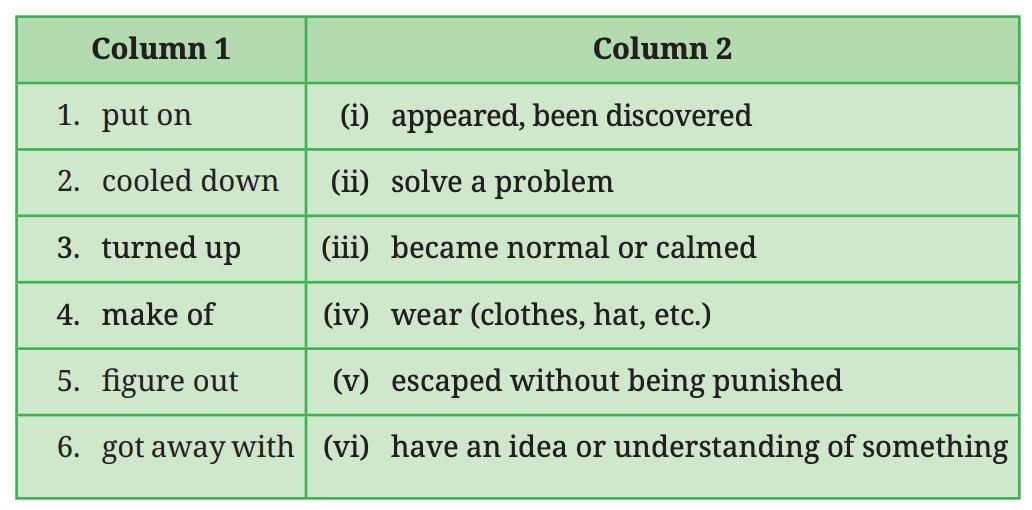 Ans:
Ans: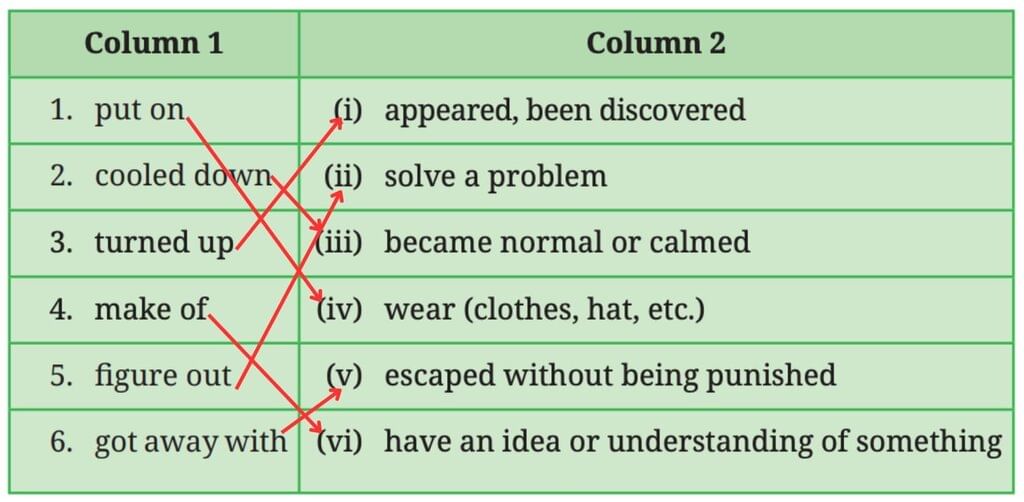
Now, fill in the blanks with the phrasal verbs given in Column 1.
A. Finally, some important evidence about the case has _______________.
Ans: Finally, some important evidence about the case has turned up.
B. After I _______________, I understood that I had made a big mistake.
Ans: After I cooled down I understood that I had made a big mistake.
C. I couldn’t _______________ why he was angry with me.
Ans: I couldn’t figure out why he was angry with me.
D. He _______________ his special coat and went to his friend’s birthday party.
Ans: He put on his special coat and went to his friend’s birthday party.
E. Ravi forgets to do his homework but he _______________ it as teacher didn’t ask for it that day.
Ans: Ravi forgets to do his homework but he got away with it as teacher didn’t ask for it that day.
F. I do not know what to _______________ his behaviour.
Ans: I do not know what to make of his behaviour.
II. Fill in the blanks in the following sentences by choosing the correct word pairs from the box given below.
2. When the committee met yesterday, they brought _________________ local cases to the _________________.
3. While learning to drive, Rina used too much force on the _________________, causing the car to _________________ down.
4. He has composed a beautiful _________________ of music in order to bring _________________ to thousands of people.
5. She was busy _________________ her hair not caring about the _________________ flowers in her garden.
Ans:
1. After running for 50 kilometres last week I felt weak for two days.
2. When the committee met yesterday, they brought four local cases to the peace.
3. While learning to drive, Rina used too much force on the brake, causing the car to break down.
4. He has composed a beautiful piece of music in order to bring peace to thousands of people.
5. She was busy braiding her hair not caring about the flowers in her garden.
III. Leroy solved the mystery of the missing fifth word with his critical thinking abilities. Work in pairs to solve the puzzles given in the illustrations below and infer what they say. One example has been done for you
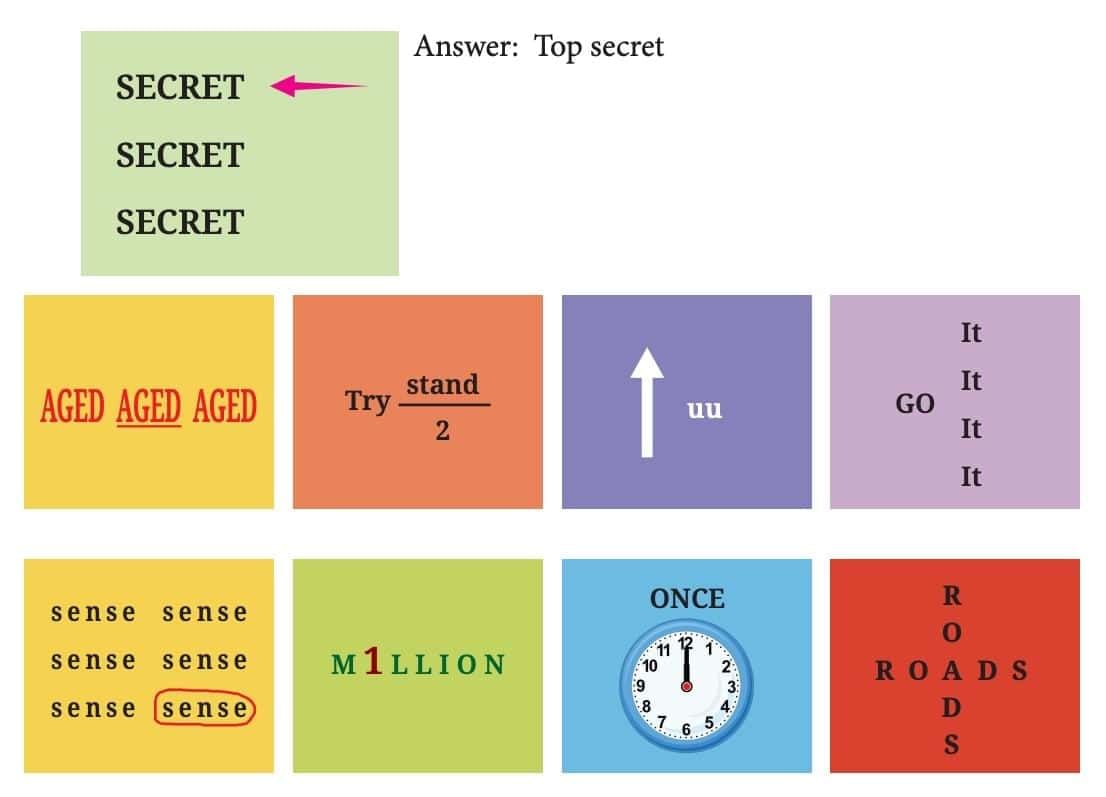
Ans: Middle-aged, Try to understand, Up to you, Go for it, Sixth sense, One in a million, Once upon a time, Crossroads
IV. Spoonerism is a mistake made when speaking, where the first sounds of the words in a phrase or a sentence are exchanged with each other. This usually gives a funny meaning. Some examples of spoonerism are saying ‘wrong load’ instead of ‘long road’, 'round of mice’ instead of ‘mound of rice’.
Find the correct order for the following spoonerisms.
1. knowing sits
2. it’s roaring with pain.
3. plaster man
4. blarm wanket
5. tars and crucks
6. shake a tower
7. bead a rook
8. mardon me padam
1. knowing sits → sowing knits (or more sensibly: sewing knits)
2. it’s roaring with pain → it’s pouring with rain
3. plaster man → master plan
4. blarm wanket → warm blanket
5. tars and crucks → cars and trucks
6. shake a tower → take a shower
7. bead a rook → read a book
8. mardon me padam → pardon me madam
V. Read the following sentences from the text and study the highlighted words.
 Detective stories are exciting, keeping readers guessing (i) ____________ the real culprit is. They take place in settings (ii) ____________ clues are hidden carefully. (iii) ____________ the mystery seems tricky, a clever detective always finds answers. Readers often wonder (iv) ____________ criminals leave small but important clues. The challenge is to decide (v) ____________ suspect is guilty. (vi) ____________ the truth is revealed, everything makes sense. But one may wonder (vii) ____________ they could have solved it themselves. These stories are fun (viii) ____________ they make readers think till the very end.
Detective stories are exciting, keeping readers guessing (i) ____________ the real culprit is. They take place in settings (ii) ____________ clues are hidden carefully. (iii) ____________ the mystery seems tricky, a clever detective always finds answers. Readers often wonder (iv) ____________ criminals leave small but important clues. The challenge is to decide (v) ____________ suspect is guilty. (vi) ____________ the truth is revealed, everything makes sense. But one may wonder (vii) ____________ they could have solved it themselves. These stories are fun (viii) ____________ they make readers think till the very end.Ans: i) who
(ii) where
(iii) Though
(iv) why
(v) which
(vi) When
(vii) if
(viii) because
VI. Combine the following pairs of sentences using the word given in brackets. One example has been done for you.
Ans: We gave him the signal that he was waiting for.
Ans: We went to the place where the incident occurred.
Ans: The teacher, who is now nearly sixty, said she would retire soon.
Ans: It was the day when half the class was absent.
VII. Read the following sentences from the text
1. “What’s suspicious about that?” Mrs. Brown asked.
2. “What do you make of the four words, Leroy?”
3. “Wasn’t he mixed up in a jewellery robbery a few years ago?”
4. “Didn’t you search Nolan’s house, dear?”
5. “Is there a young fir tree in Mr. Nolan’s palm-tree nursery?”
The given sentences are the direct words of the speaker, hence, they are in direct speech. While reporting these direct words to someone else at some other time and some other place, we make certain modifications in person, tense, and adverbs of place and time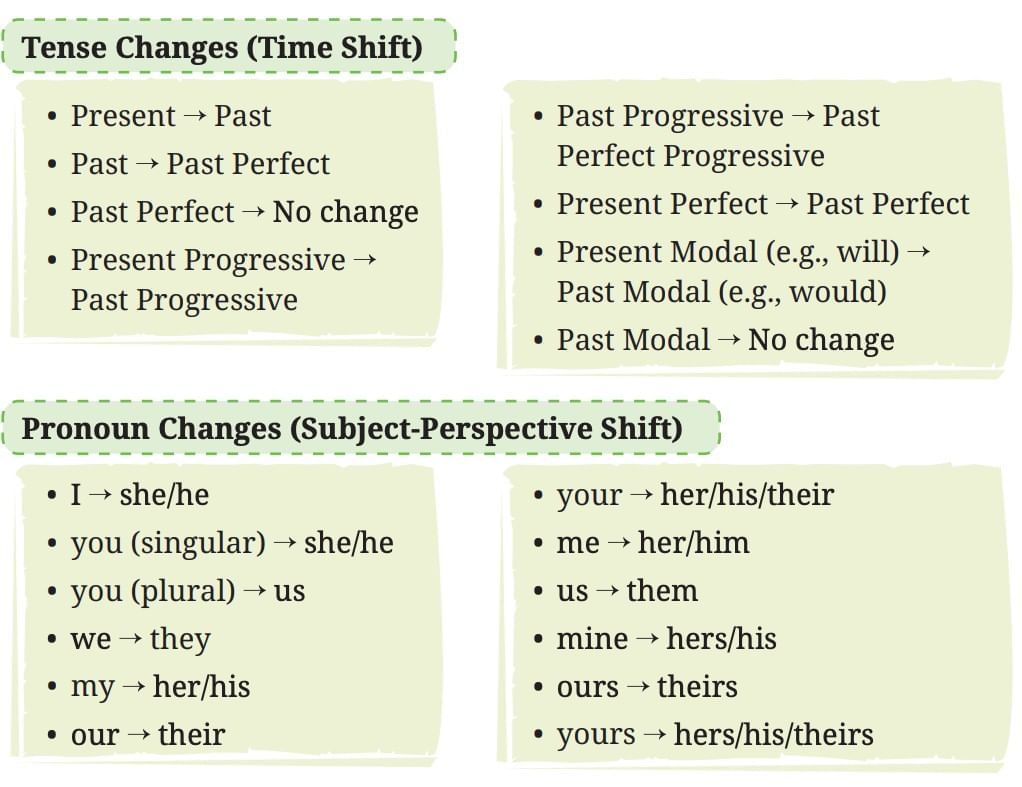
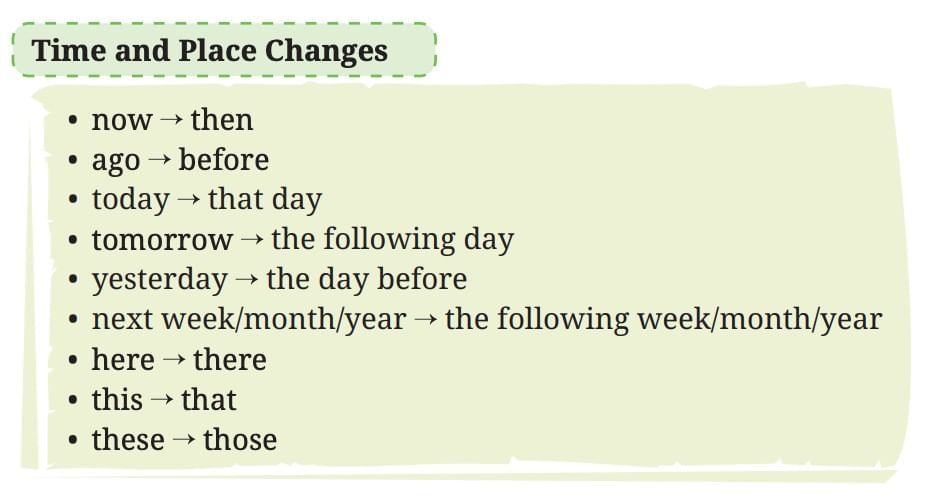 There are two types of Interrogative sentences. They are Wh– questions and Yes/No questions.
There are two types of Interrogative sentences. They are Wh– questions and Yes/No questions.
Steps for Reporting Wh– questions and Yes/No questions
1. Replace the reporting verb ‘said’ with words like ‘asked’, ‘inquired ’, ’ interrogated’, or ‘questioned’.
2. Convert the interrogative sentence into a declarative one.
3. Apply the appropriate tense shift as per the rules of tense changes.
4. Remove quotation marks and the question mark.
5. Omit the conjunction ‘that’ in the reported speech.
6. In Wh– Wh-questions, place the Wh–word immediately after the reporting verb in the reported speech.
7. In Yes/No questions, use ‘if’ or ‘whether’ immediately after the reporting verb in the reported speech.
Now, follow these steps to transform the sentences given as examples from direct speech to indirect speech. Indirect Speech
(i) Mrs. Brown asked ______________________________________________.
Ans: Mrs. Brown asked what was suspicious about that.
(ii)Mrs. Brown questioned Leroy __________________________________.
Ans: Mrs. Brown questioned Leroy what he made of the four words.
(iii) Mrs. Brown inquired __________________________________________.
Ans: Mrs. Brown inquired whether Tim Nolan had been mixed up in a jewellery robbery a few years before.
(iv) Mrs. Brown asked Chief Brown ________________________________.
Ans: Mrs. Brown asked Chief Brown whether he had searched Nolan’s house.
(v) Mrs. Brown inquired ___________________________________________.
Ans: Mrs. Brown inquired whether there was a young fir tree in Mr. Nolan’s palm-tree nursery.
VIII. Rewrite the following sentences in Reported Speech.
Rohan questioned __________________________________________________.
Ans: Rohan questioned why I had stopped talking to him.
My aunt asked ______________________________________________________.
Ans: My aunt asked whether I had enjoyed the family gathering the day before.
My grandmother inquired _________________________________________.
Ans: My grandmother inquired when I would visit them again.
Madavi asked Ravi __________________________________________________.
Ans: Madavi asked Ravi whether he would come with her to meet their old teacher the following day.
My friend inquired _________________________________________________.
Ans: My friend inquired what gift I was planning to give my brother.
Veenu asked her teacher ____________________________________________.
Ans: Veenu asked her teacher whether she should carry those notebooks to the staffroom.
IX. Read the conversation between Aditi and Rahul
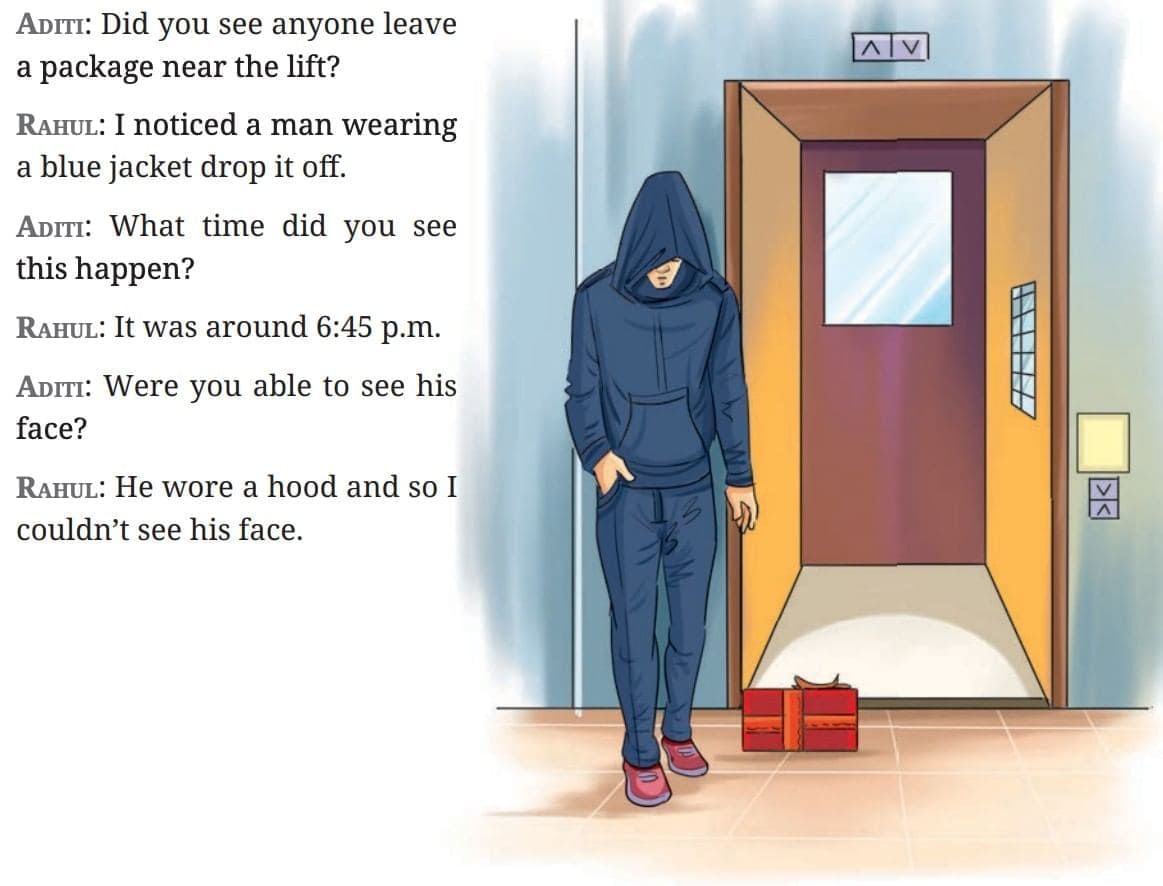 Complete the following paragraph by transforming the dialogue in indirect speech.
Complete the following paragraph by transforming the dialogue in indirect speech. Aditi asked Rahul 1. ___________________________________________________.
Ans: Aditi asked Rahul whether he had seen anyone leave a package near the lift.
Rahul replied that he had noticed a man wearing a blue jacket drop it off.
Rahul replied that he had noticed a man wearing a blue jacket drop it off.
Aditi asked Rahul 2. ___________________________________________________.
Ans: Aditi asked Rahul what time he had seen it happen.
Rahul replied that it had been around 6:45 p.m.
Rahul replied that it had been around 6.45 p.m.
Aditi further inquired 3. _______________________________________________.
Rahul said that he had worn a hood, so he couldn’t see his face.
Ans: Aditi further inquired whether he had been able to see his face.
Rahul said that he had worn a hood, so he couldn’t see his face.
Let us listen (Page 117)
I. You will listen to a podcast about ways of improving observation skills. As you listen, mark the statements 1–4 as true or false.
1.Observation skills help improve your common sense.
Ans: True
2. Rushing through tasks helps you focus better and observe more.
Ans: False - rushing reduces focus.
3. Taking notes or making sketches helps with what you observe.
Ans: True
4. Incorporating tips on observation skills will soon lead to success.
Ans: True
II. You will once again listen to the podcast. As you listen, complete the given sentences by filling in the blanks with one to three exact words you hear.
Ans: It is important to slow down and to notice several aspects around you more clearly.
Ans: The more senses like hearing and smelling you use, the more you absorb.
Ans: People who are curious tend to be better observers because they seek to understand what they notice.
Ans: When you make a note of things, it helps reinforce the information in your memory.
Ans: Practising mindfulness helps a person stay present with their surroundings.
Let us speak (Page 118)
I. Read the following words from the text loudly with the help of the pronunciation guide given in brackets
January (ja-nyoo-uh-ree), sour (sau-uh), pizza (peet-zaa), Wednesday (wenz-day), bowl (bol), buffet (buh-fay), pronunciation (pruh-nuhn-see-ay-shn)
II. Work in groups of five or six. Conduct a group discussion on the topic,‘The Interesting Aspects of a Mystery Story’.
Guidelines
• The moderator initiates the discussion inviting the speakers to share their views on the subject.
• The speakers take turns to put forth their viewpoint using polite expressions to agree or disagree.
• The speakers may interrupt by raising their hands to add or clarify a point.
• The moderator ensures equal participation of all the members in the group, consolidates views, and calls upon other speakers to respond.
• The moderator sums up the points of discussion, suggests guidelines for future action and thanks the members of the group.
Note: Choose a moderator. Decide upon the duration of the discussion.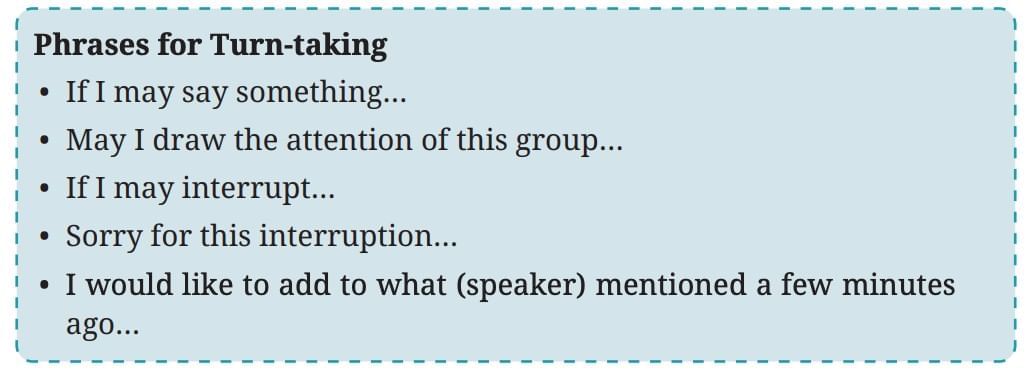
 Ans: This is a classroom activity. Follow these guidelines:
Ans: This is a classroom activity. Follow these guidelines:
- The moderator starts by asking group members to share what makes mystery stories exciting.
- Speakers take turns, e.g., “I think mysteries are fun because they keep you guessing.”
- Use phrases like “If I may say something...” or “I agree with...” to agree/disagree politely.
- Example points: Mysteries have suspense, clever clues, and surprising endings.
- The moderator ensures everyone speaks and sums up, e.g., “We agree mysteries are exciting because of clues and twists.”
Let us write (Page 119)
I. A report is written for an event that has already occurred. The purpose of a report is to provide first-hand details of an incident or event. It presents the information in a proper sequence. Read the sample report written about the ‘Inter-school Football Tournament’ organised by your Vidyalaya. Note the format, content, and language used.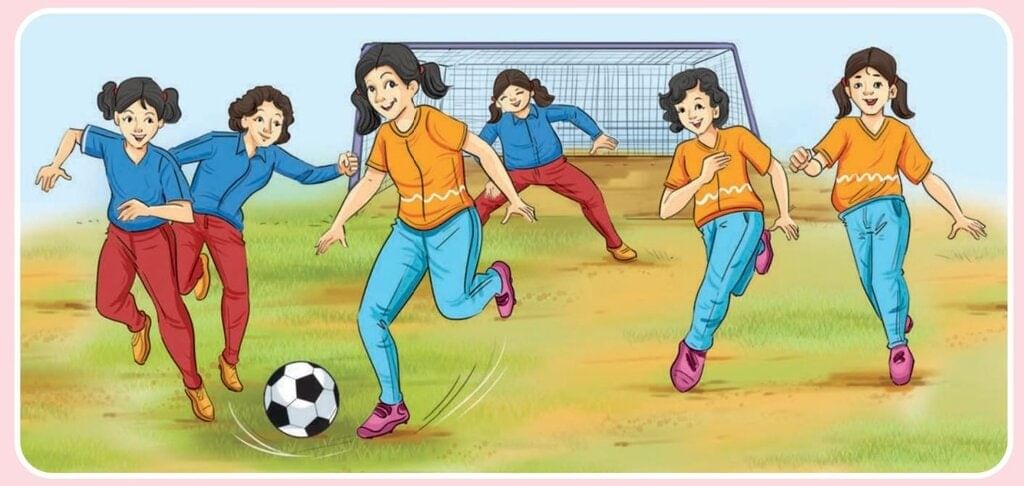
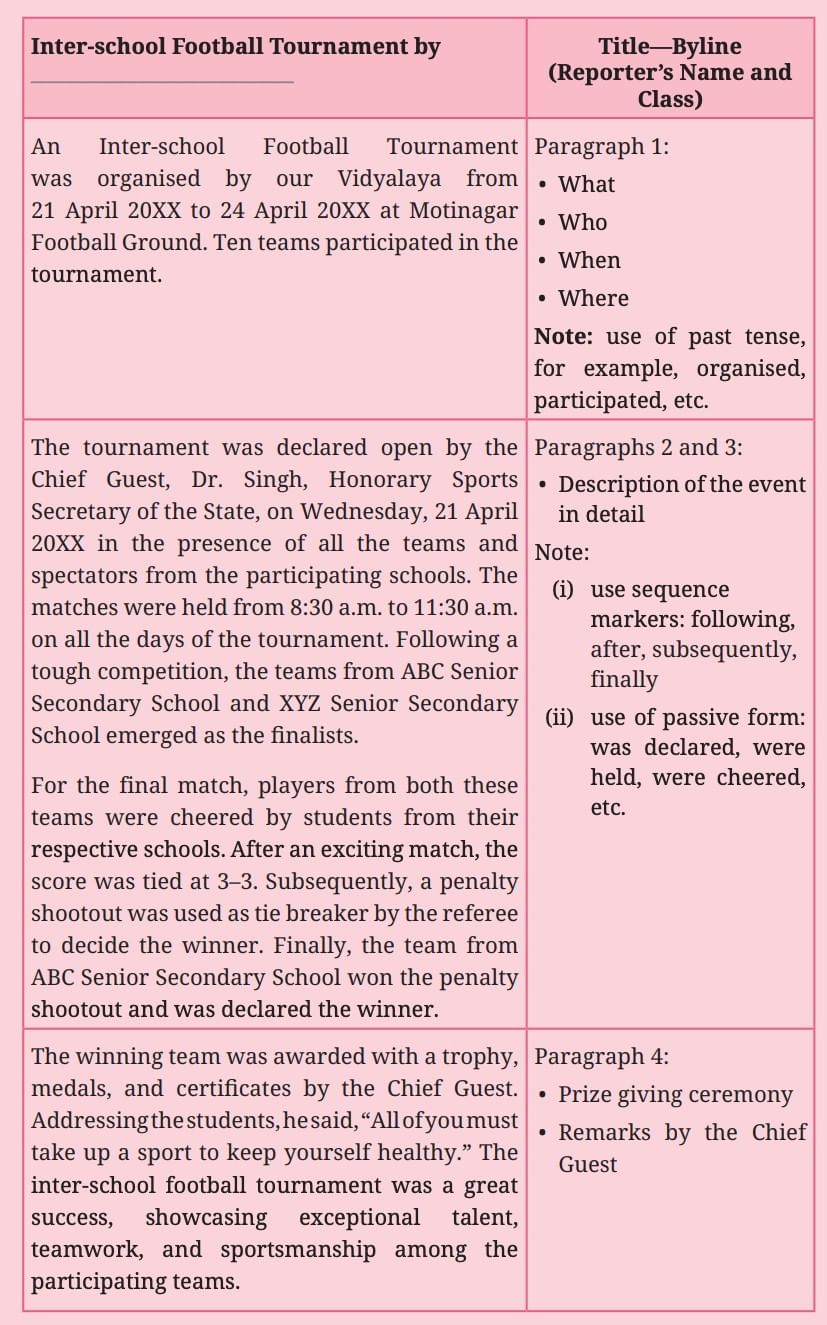 Now, as a member of the Art and Craft Club, write a report on an ‘Inter-school Art Exhibition’ organised by your school. Include the necessary details
Now, as a member of the Art and Craft Club, write a report on an ‘Inter-school Art Exhibition’ organised by your school. Include the necessary details
Ans:
Inter-school Art Exhibition Report
[Your School Name], [City]
1 August 2025
Our school hosted an Inter-school Art Exhibition on 25 July 2025 in the school auditorium. Five schools participated, showcasing paintings, sketches, and crafts by students. The theme was “Nature and Imagination.” Each school set up colourful stalls with artworks like drawings of forests and creative sculptures. Over 200 visitors, including parents and teachers, attended. The chief guest, a local artist, praised the students’ creativity. Our school won the “Best Display” award. The event encouraged young artists and was a great success.
Reported by: [Your Name], Art and Craft Club Member
Let us explore (Page 121)
I. Work in pairs. Read the words and observe the images given below. Check if your answers match. Share your answers with your classmates and teacher.
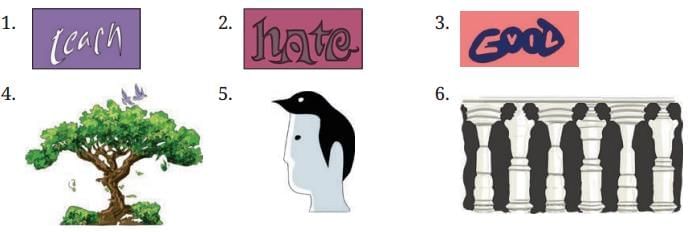
These are optical illusions which may trick the eye and make you think that you can see two different things.
Ans: Do it yourself.
II. Read the steps to play a language game—Name the mystery object.
1. Divide the class into teams.
2. Each team chooses an object and prepares three hints to enable the other teams to name the object.
3. Each team takes turns to name the object given by the other team.
4. If a team names the object with the first hint, they get 20 points, with the second hint 10 points, and with the third hint 5 points.
One example with three hints:
(i) I display information for all to share, with a swipe I’m clean and bare.
(ii) I am rectangular or a square, whom neither teacher nor student can spare.
(in) I am mostly black, sometimes green, now in white too I am seen.
Ans: Do it yourself.
III. Visit the library and look for an encyclopedia. What is it? Check how it is different from a dictionary. Share your answers with your classmates and teacher.
Ans: An encyclopedia is a reference book (or a set of books) that provides detailed information on a wide range of subjects. The articles are usually arranged alphabetically and contain facts, explanations, and background knowledge written by experts. Encyclopedias can be general (like Encyclopedia Britannica) or subject-specific (like an Encyclopedia of Animals or Science).
IV. A thesaurus is a reference book or digital tool that provides a collection of words with similar meanings, allowing users to find alternative words or phrases to express the same idea. Choose any five words and find out their alternative words from the thesaurus.
Ans:
1. Happy
Synonyms: joyful, cheerful, delighted, content, elated
2. Fast
Synonyms: quick, speedy, rapid, swift, brisk
3. Beautiful
Synonyms: attractive, lovely, stunning, charming, elegant
4. Smart
Synonyms: intelligent, clever, bright, sharp, brainy
5. Angry
Synonyms: mad, furious, annoyed, upset, irritated
|
56 videos|435 docs|57 tests
|
FAQs on The Case of the Fifth Word NCERT Solutions - English Poorvi Class 8 - New NCERT
| 1. What are the key themes discussed in "The Case of the Fifth Word"? |  |
| 2. How can reflection improve our learning process according to the article? |  |
| 3. Why is listening considered an essential skill in communication? |  |
| 4. In what ways does writing contribute to effective communication as discussed in the article? |  |
| 5. How does the article encourage proactive learning practices? |  |






















